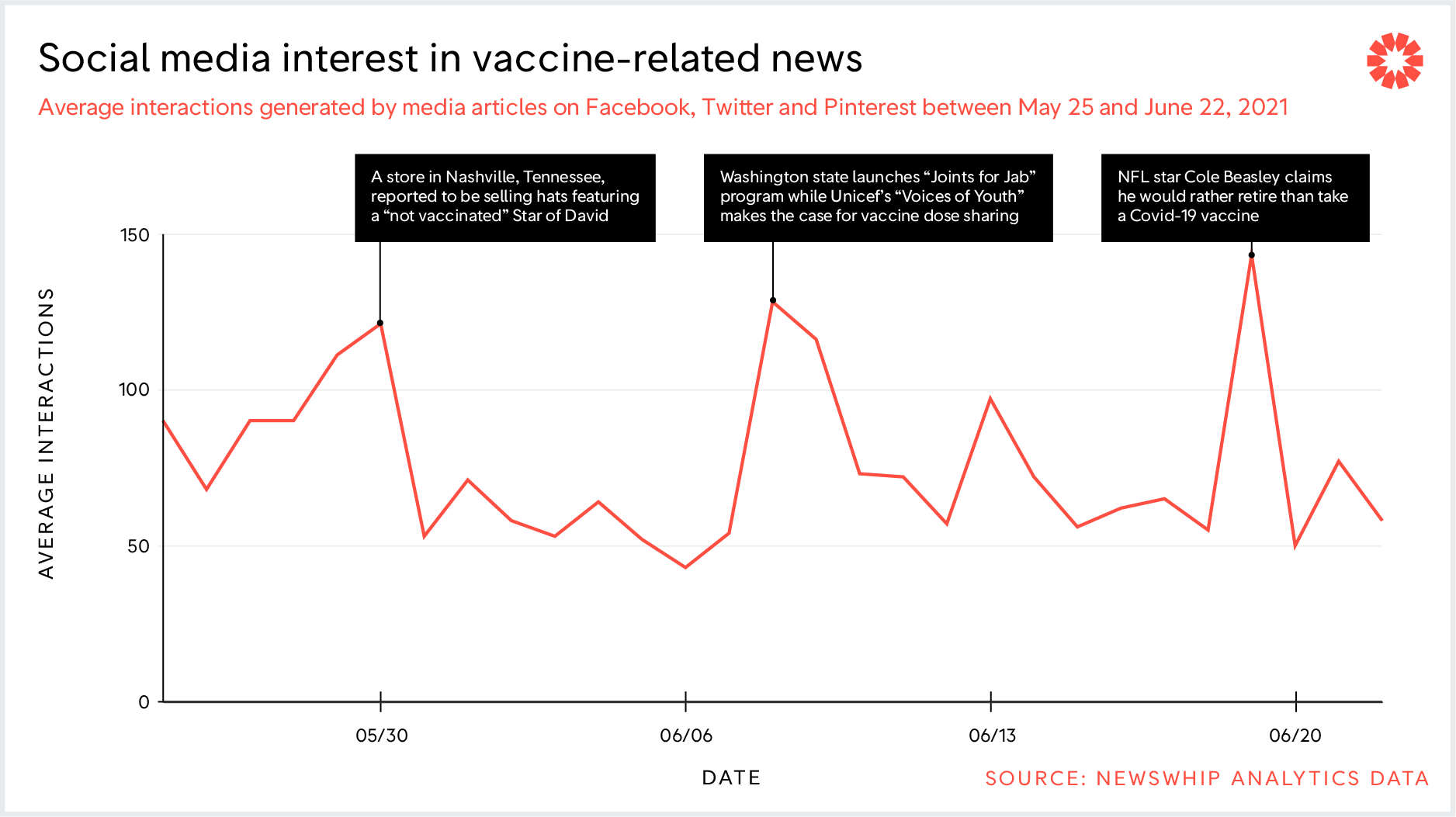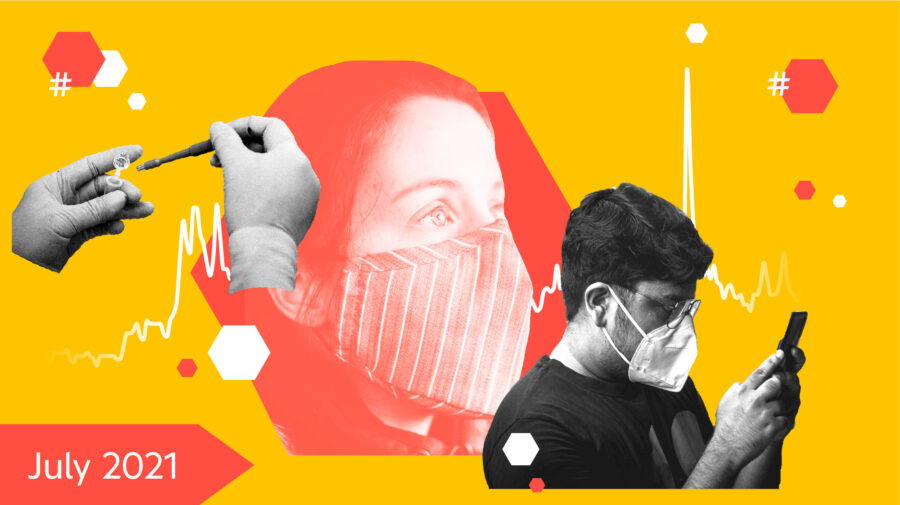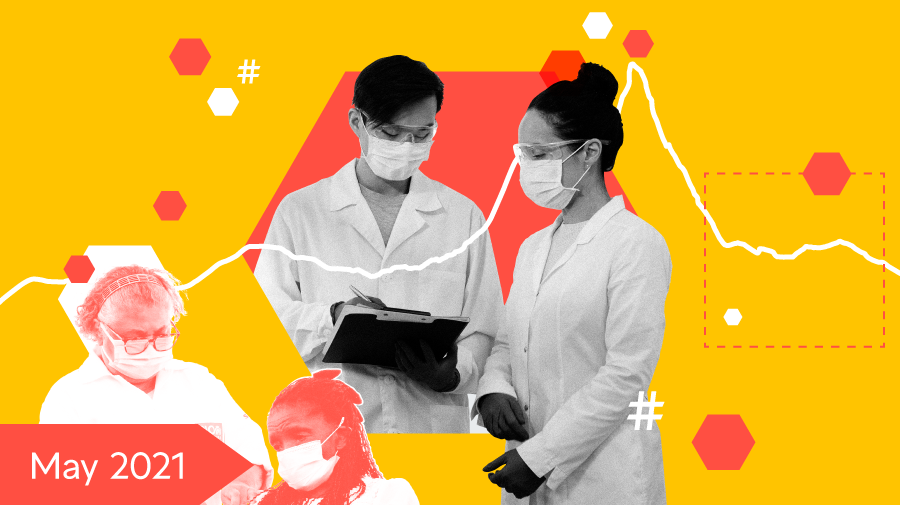This is the third installment of a four-part insights report series, published at the start of each month, that provides a summary of the key trends and insights on information disorder related to vaccines over the past 30 days. As First Draft continues to monitor Covid-19 vaccine misinformation around the world, these reports are designed to highlight the most relevant media trends, narratives, emerging threats and data deficits we identify.
Media Trends
During June, English-language media coverage of vaccines largely revolved around vaccine dose sharing and patent waiver debates as the Biden administration moved to buy and distribute 500 million doses of the Pfizer vaccine to poorer countries.
An article by Voices of Youth, a Unicef community initiative, titled “Why vaccine dose sharing is important,” was the most engaged-with media article on social media after generating more than 670,000 combined interactions on Facebook, Twitter and Pinterest, according to NewsWhip Analytics.
Debates over the implications of vaccines on civil liberties once again came to the forefront of vaccine-related conversations online. This followed reports that a hospital in Houston moved to suspend 178 of its employees because of their refusal to get vaccinated, and a concert promoter in Florida offered discounted tickets to people who had received a Covid-19 shot. Three online reports that covered these stories received more than 75,000 social interactions.
A closer look into the online reaction to these reports reveals the highly partisan nature of the divide over vaccines and civil liberties in the US. Pro-Democrat, anti-Trump and other left-leaning communities celebrated the reports, with certain sources suggesting that stricter rules should be implemented to penalize those who refuse to get inoculated. Conservative, pro-Republican and anti-lockdown sources framed the measures as discriminatory. Several “reopen” Facebook Groups labeled the measures as steps toward “medical Marxism.”
Plans by Republican Senator Ted Cruz of Texas to introduce federal legislation that would prohibit vaccine passport mandates also attracted significant interest on social media. Two related reports garnered more than 100,000 interactions each across Facebook, Twitter and Pinterest.

Other key themes of vaccine media coverage included the World Health Organization’s approval of Sinovac, a Chinese-made Covid-19 vaccine; the prevalence of non-vaccinated people among patients hospitalized with Covid-19 in the US; and safety concerns related to Pfizer and Moderna’s Covid-19 vaccines following a reported uptick in cases of myocarditis among young people.
Vaccine Narratives
Covid-19 vaccines are unnecessary and/or are driven by corrupt financial interests
The idea that vaccines are unnecessary or that they are driven by vested and corrupt financial interests preceded the rollout of Covid-19 vaccines. Yet, as influencers continue to push unsubstantiated claims that Ivermectin — an anti-parasitic drug — is a proven Covid-19 treatment, these two narratives are seeing a resurgence on social media.
There is currently little evidence that Ivermectin can speed recovery from Covid-19 or reduce the likelihood of hospital admission. The University of Oxford announced that it would conduct a large-scale trial “to generate robust evidence to determine how effective the treatment is against COVID-19, and whether there are benefits or harms associated with its use.” Despite this lack of evidence, posts claiming Ivermectin is highly effective against the coronavirus have been garnering significant engagement on social media and are being used to suggest that Covid-19 vaccines are unnecessary.
Other posts on Facebook and Twitter are spreading the unfounded claim that Ivermectin has been subjected to a massive “disinformation campaign” by pharmaceutical companies and health regulators in order to ensure the profitability of vaccines. This unsubstantiated claim was amplified by several guests on a recent episode of the Joe Rogan Experience podcast.
Covid-19 vaccines undermine civil liberties, mandates are a step toward “medical Marxism”
Conversations surrounding the implications of vaccines on individual and civil liberties have been a key feature of online discussions since the start of the race to develop a coronavirus vaccine. This is particularly true in North America, where influential right-leaning, libertarian sources often frame mask mandates, social restrictions and vaccination campaigns as an attack on civil liberties.
Off the back of proposed federal anti-vaccine passport legislation in the US and decisions by certain organizations to implement de facto mandatory vaccine rules, such as unpaid suspensions of unvaccinated employees, narratives revolving around individual freedoms have again come to the forefront of vaccine-related conversations in North American-linked online spaces.
Numerous pro-Trump, anti-lockdown and other traditionally right-leaning online communities have described de facto mandatory vaccine policies as “medical Marxism.” Such highly divisive and emotive rhetoric has also appeared offline in recent weeks. A store in Nashville, Tennessee, was reported to have been selling hats that featured the Star of David inscribed with the words “NOT VACCINATED.”
Conspiracy theory-friendly online sources have framed the recent imposition of de facto mandatory vaccine policies as “the beginning” of the transition toward a dystopian, totalitarian state-controlled society.
There are legitimate concerns over the practical, ethical and societal implications of direct and indirect vaccine mandates. But unfounded suggestions and vaccine-related conspiracy theories have the potential to further erode trust in institutions and ultimately suppress vaccine uptake.
Covid-19 vaccines are dangerous and unnecessary for children and adolescents
In May, Canada and the US became the first countries in the world to approve the use of Pfizer-BioNTech Covid-19 vaccines in children ages 12-15. The UK, France, Germany and several other European countries have followed suit. The announcement brought a wave of misinformation and conspiracy theory-related posts attacking the use of vaccines in children and young adults.
Fear and misinformation surrounding the safety of vaccines among children have circulated for decades. Unfounded claims range from the misconception that natural immunity is better than vaccine-acquired immunity to the widespread and false fear that vaccines increase the risk of autism. These unsubstantiated claims have been indiscriminately applied to different vaccines.
In the context of Covid-19 vaccines, many social media posts claim that it’s unethical to put kids in “danger” with vaccines only to protect the elderly, given that children have only a small chance of dying from Covid-19. According to this narrative, the protection offered by vaccines isn’t worth the potential side effects. Other misleading claims lean heavily on the idea that Covid-19 vaccines are experimental and no one knows the potential side effects in children. Clinical trials have shown the Covid-19 vaccines are safe and effective for children; the CDC recommends vaccination for those 12 and older.
Recent rare cases of myocarditis — a kind of heart inflammation — mostly in teenage boys and young men following the second dose of Covid-19 vaccines have complicated the situation. They have precipitated a wave of misleading social media posts pushing the idea that vaccines are dangerous and unnecessary for children. A now-deleted post from a Twitter user claiming a young family member died after being vaccinated amassed over 32,000 retweets. A number of anti-vaccine influencers used screenshots of the tweet to further erode trust in the use of Covid-19 vaccines among children.
Emerging threats and data deficits
Data deficits are where high levels of demand for information about a topic are not adequately matched by a supply of credible information. Where data deficits exist, rumors, speculation and misinformation are more likely to spread. Countering data deficits requires healthcare providers and institutions to engage in pre-emptive research that can inform proactive messaging related to these data deficits, such as “pre-bunks” and explainer pieces.
The Delta variant and vaccine protection
Growing global concern over the spread of the highly contagious Covid-19 Delta variant has spurred a flurry of posts from anti-vaccination communities challenging the effectiveness and necessity of Covid-19 vaccines.
In the UK, often a harbinger of Covid-19 trends in other countries, Delta makes up around 95 per cent of new cases. In the US, Delta’s prevalence is estimated to be 37 to 42 percent of cases as of June 20.
Anti-vaccination activists are leveraging recent deaths associated with the variant and the existence of Delta cases among those vaccinated to suggest that Covid-19 vaccines are ineffective and unnecessary. Such claims ignore the context that this figure is in line with known efficacy statistics, and that few people who were vaccinated developed severe illness.
No vaccine is 100% effective in preventing disease. Yet Covid-19 vaccines have been shown to be highly effective against hospitalization from the Delta variant. A recent Associated Press analysis showed that unvaccinated people account for almost all deaths from Covid now. Nonetheless, this wave of misleading claims about the “ineffectiveness” of the Covid-19 vaccine against Delta could potentially discourage vaccine uptake at a critical juncture in the pandemic.
Pfizer/Moderna vaccine safety and myocarditis
On June 23, the US Centers for Disease Control and Prevention announced that it had found more cases of myocarditis, or pericarditis, resulting from mRNA vaccines than projected. While these events remain rare, online anti-vaccine sources were quick to weaponize this announcement, using it to push wider anti-vaccine narratives through hyper-alarmist rhetoric.
Establishing causal links between any medical treatment and serious conditions is a notoriously challenging and lengthy endeavor that requires extensive study and research. New safety concerns naturally attract high levels of public interest. In such instances, definitive and trustworthy information can often be scarce, at least in the short run. The resulting gap between demand for and supply of credible information opens the door for rumors and misinformation to spread. For example, any new safety-related issue can be quickly seized upon by anti-vaccine advocates and framed as “proof” that Covid-19 vaccines are “experimental” and dangerous (See last month’s report.)
As the Covid-19 vaccine rollout among children and adolescents gathers pace, additional, extremely rare reactions undetected in clinical trials could yet emerge.
In order to stymie the emergence of misinformation, highly contextualized, pre-emptive messaging that addresses these potential issues in a factual and transparent manner must be provided. Failure to do so may allow anti-vaccine sources to exploit these information deficits and amplify feelings of uncertainty.
Vaccine effects on menstrual cycles
Data deficits around how Covid-19 vaccines affect menstrual cycles have already made women victims of vaccine mis- and disinformation. Unverified claims circulating online are connecting Covid-19 vaccines to menstrual cycle irregularities such as periods randomly stopping, periods restarting after menopause, and bleeding lasting longer and being heavier following vaccination.
In the last week, several UK media organizations published articles detailing how more than 4,000 women reported menstrual irregularities to the UK Medicines and Healthcare products Regulatory Agency (MHRA) “Yellow Card” program. Yellow Card allows anyone to submit reports of suspected adverse reactions to Covid-19 vaccines. These reports are not verified and are only used to monitor the emergence of potential side effects. Several gynecologists interviewed said that these changes “could be coincidental.” The news has been widely shared on social media without context and alongside misleading claims by vaccine skeptics and natural health accounts.
It’s unclear whether Covid-19 vaccines are related to these menstrual changes; there is currently insufficient data to establish any clear relationship. Nonetheless, searches for “covid vaccine effect on menstrual cycle” on Google have risen by 110 per cent worldwide in the last week, according to Google Trends data.
In focus: Ivermectin revives false hydroxychloroquine claims and false narratives
There are striking similarities in how Ivermectin and hydroxychloroquine have played out on social media. Both have been touted as “miracle” drugs against Covid-19, despite very thin evidence to support these claims. Both had some success treating Covid-19 in test tubes as opposed to clinical studies in patients — there is still no robust evidence that they are effective in people — and have been championed by individual doctors, lending the drugs a veneer of legitimacy. Both drugs have benefited from the widespread support of anti-vaccine activists, conspiracy theorists, “reopen” groups and libertarians. They have pushed the narrative that vaccines are unnecessary, along with the unsubstantiated notion that the benefits of these drugs are being suppressed so vaccine makers and governments can reap more profit.
Unlike hydroxychloroquine, Ivermectin will likely not benefit from the endorsement of the White House — former US President Donald Trump called hydroxychloroquine a “game changer” against Covid-19. But Ivermectin has already been highly politicized, enjoying a bump in engagement, both online and off, from the same base that continues to promote the anti-malarial drug as an effective Covid-19 treatment.
Twitter is now abuzz with tweets espousing the “benefits” of both drugs. The fact that other countries and regions, such as India and Latin America, have controversially embraced both treatments has only perpetuated claims about the drugs’ effectiveness.
The unproven “lab-leak theory” has crept back into headlines recently, entrenching the idea among Trump supporters and conspiracy theorists that information related to Covid-19 and vaccines is being suppressed.
Misleading claims around the effectiveness of hydroxychloroquine still abound and are gaining traction again, underlining the “stickiness” of these “miracle” drugs on social media and within Covid-19 vaccine discourse.
Even if the results of the University of Oxford’s recently announced study eventually show that Ivermectin has no benefit for patients with Covid-19, similar to hydroxychloroquine, social media posts championing the effectiveness of Ivermectin and downplaying the usefulness of Covid-19 vaccines are likely to stick around. As the Delta variant continues to spread and Covid-19 deaths concentrate among unvaccinated people, the vaccine-suppressing narratives attached to these two drugs are particularly worrisome.






